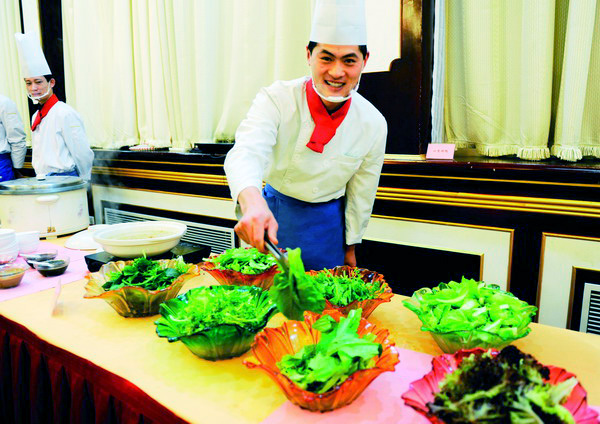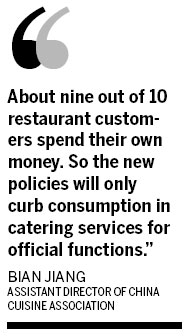Catering industry faces slow growth this year
Updated: 2013-01-31 09:40
By Wang Zhuoqiong (China Daily)
|
|||||||||||
|
 A chef displays vegetables at a banquet room during a local government meeting in Jinan, Shandong province. Serving vegetables rather than expensive luxury dishes are part of government measures to reduce extravagance. [Photo / China Daily] |
But experts say spending by private sector will lessen blow to revenues
Catering businesses are feeling the effects of the government's recent announcement of a clampdown on extravagance and waste, according to a leading industry representative body.
The country's catering sector grew 13 percent last year, and was worth 2.38 trillion yuan ($384 billion), said Bian Jiang, assistant director of China Cuisine Association.
But that was 3 percent lower than previous expectations, and 3 percent down on 2011, after 23 years of consecutive growth, he added, which he attributed to a combination of the weaker economy, and the effect of the government's call to cut back on extravagance at the end of last year.
He said the beginning of 2013 is expected to show significant reductions in catering bookings, particularly at high-end restaurants and hotels, followed by sluggish performances throughout the whole year.
However, Bian said the policy will not hurt overall restaurant revenues too badly, because the majority of expenditure comes from the private sector and individuals, not government departments or organizations.
|
 |
"About nine out of 10 restaurant customers spend their own money," he said. "So the new policies will only curb consumption in catering services for official functions."
Some leading high-end restaurants have already reported being less optimistic of their fortunes this year, with many complaining of losing key customers at a time when they normally expect major spending on year-end banquets and conferences.
Media reports have revealed a rise in discounts and promotions by some restaurants, previously reliant on business banquets, after finding bookings were well down on last year.
Chen Junhai, an executive at Wangshunge Restaurant Group in Beijing, said the move to eradicate public-funded extravagance had been a big blow to many high-end catering businesses.
About 30 percent of Wangshunge's income comes from business customers, hosting luxury banquets to entertain VIP guests, Chen said.
But the group, which has 12 outlets in Beijing, has rolled out measures to save costs and reduce waste.
For example, waiters have been asked not to promote luxury dishes, and to remind guests to order only what they actually need.
Any food remaining can be taken away in free packaging, Chen said.
The China Cuisine Association has now launched a campaign to urge restaurants to introduce cost cuts on purchasing, production and service.
But Bian said the habit of pleasing business clients with extravagant banquets has been deeply rooted in Chinese culture and will not be reversed overnight.
Across the country, the call to put an end to extravagant official banquets and wasted food has seen many restaurants placing "clean your plate" notices on dining tables, calling on customers to take uneaten food home after banquets and meals.
Contact the writer at wangzhuoqiong@chinadaily.ocm.cn
Related Stories
China's catering sector revenues rise to 2.1t yuan 2012-12-21 09:10
HK catering industry records profits 2012-11-28 10:17
China retail, catering sales surge in holiday 2012-10-09 09:07
China Catering Expo opens in Macao 2012-09-22 10:00
Caterers could benefit from consolidation 2012-09-20 15:32
Zhang Lan cooks up beautiful success 2012-11-03 09:40
Today's Top News
President Xi confident in recovery from quake
H7N9 update: 104 cases, 21 deaths
Telecom workers restore links
Coal mine blast kills 18 in Jilin
Intl scholarship puts China on the map
More bird flu patients discharged
Gold loses sheen, but still a safe bet
US 'turns blind eye to human rights'
Hot Topics
Lunar probe , China growth forecasts, Emission rules get tougher, China seen through 'colored lens', International board,
Editor's Picks

|

|

|

|

|

|





